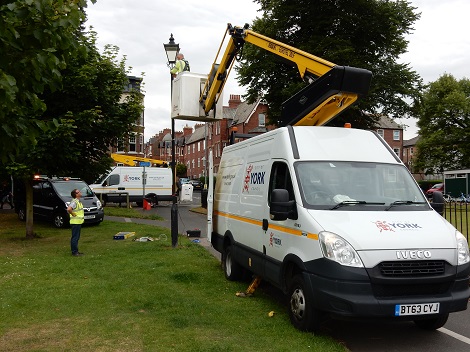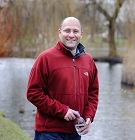York's environment is under the spotlight in a new city-wide research project
Posted on 31 January 2017
We're working with city partners and local residents to gain a clearer picture of York's environmental challenges
 720x330.jpg)
Our researchers are working on the pilot phase of a major new environmental monitoring project for the city of York
Everything we achieve will have tangible impact on the city and its citizens”
What are the links between the environment of a city and the health and wellbeing of its population? That’s the question at the heart of a new research project – the York City Environment Observatory (YCEO) – that aims to turn the city of York into a giant source of data and knowledge, and turn its citizens into scientists.
“Lots of people have concerns and questions about the environment we live in,” explains Professor Alistair Boxall from our Department of Environment and Geography. “How does air quality affect our health? And what about issues like traffic, light pollution, pollen counts and flooding?
"All of these questions are worth answering but we simply don’t have the right data available in the right form to answer them fully.”
Monitoring technology
Plugging this gap is what the YCEO is all about. “The idea,” says Professor Boxall, “is to develop monitoring systems that gather the right kind of data to answer big societal questions. We’ll use existing sources and monitoring technologies where possible, but we’ll also look at novel ways to gather and analyse data.”
He says the advantage of gathering data in a city like York is that it is not too big, which makes it easier to monitor than say London or Manchester, but it’s still a city that is sufficiently complex.

Environmental sensors being installed in York as part of the York City Environment Observatory project
City of York Council are co-leaders of the collaborative project which could involve researchers from our departments of electronics, computer science, chemistry, sociology and physics. The YCEO project will also bring in historians to look at the way heritage and culture relates to the environment and to people’s wellbeing.
The first phase of the project is designed to identify the questions the Observatory should seek to answer.
“We have conducted consultations with residents, the business community, and the regulatory community to try to understand what questions they have about the quality of the city,” says Professor Boxall.
“The aim is to pull out three key themes from this consultation and then hold expert workshops about them.
“Let’s say one theme turns out to be noise pollution. In the workshop we would ask what data do we already have about noise in the city, what are the questions around noise pollution – its impact on sleep and health for example – and what data exists to understand that relationship. If we don’t have that data, we’ll explore how we can get it.”
In the case of noise pollution, that might mean distributing noise sensors around the city – indoors and outdoors. Or some people could be issued with a Fitbit to monitor their sleep patterns.
The researchers could also look at using drones and robots to capture data.
Citizen science
Mobile phones are central to Professor Boxall’s vision of involving York’s citizens in the project.
“I really want to use citizen science to gather data too,” he says. “Say we wanted to look at green infrastructure – the trees in the city and how they impact our quality of life. To answer these questions properly, you first need to know the location and species of trees.
“Volunteers could take pictures of individual trees, which are identified and submitted to a central database via an app, and very quickly we would get a good overall picture of the tree coverage in the city.”
As Professor Boxall makes clear, the YCEO is still only in its first planning phase. Separate funding is required to put the plans into action – with other cities and universities competing for the same pot of money. He is confident, however, that the project is built on strong foundations.
“Universities are often thought to operate in a vacuum,” he says, “but that certainly isn’t true in this case.
“This is a project co-run by the city council. All the questions we answer will come from the public, and the public will also be involved in answering them. Everything we achieve will have tangible impact on the city and its citizens. Eventually we aim to make York the model for other cities in the UK and across the world. This is just the start.”
The pilot phase of this research is funded by Research Council UK and the Innovate UK Urban Living Partnership scheme
The text of this article is licensed under a Creative Commons Licence. You're free to republish it, as long as you link back to this page and credit us.

Professor Alistair Boxall
Research interests in emerging and future ecological and health risks posed by chemical contaminants in the natural environment
Explore the work of our Department of Environment and Geography
Find out more about the York City Environment Observatory on the York Open Data site
Explore more research

A research project needed to spot trees on historic ordnance survey maps, so colleagues in computer science found a solution.

We’re using gaming technology to ensure prospective teachers are fully prepared for their careers.

A low cost, high-accuracy device, could play a large part in the NHS's 'virtual wards'.
